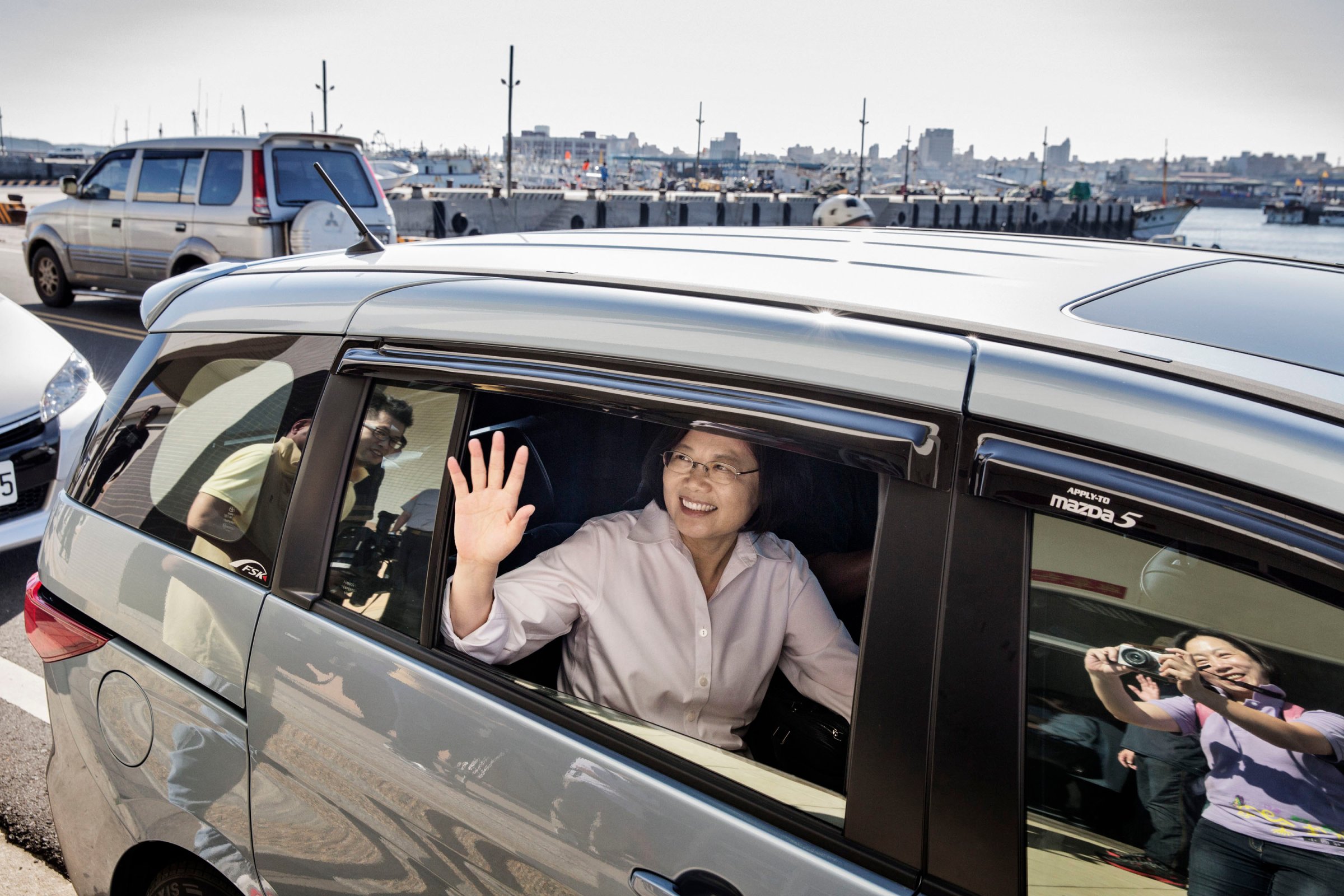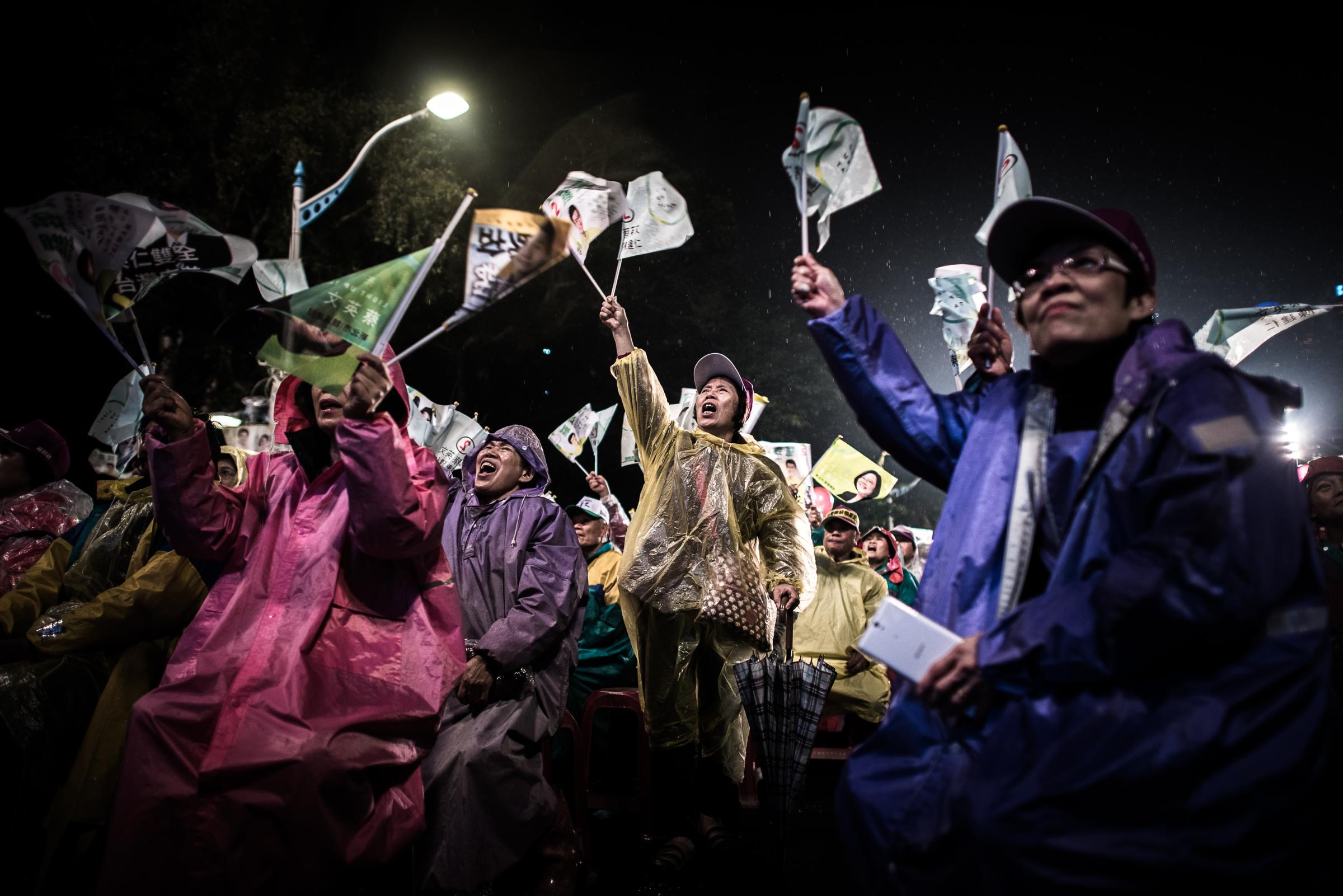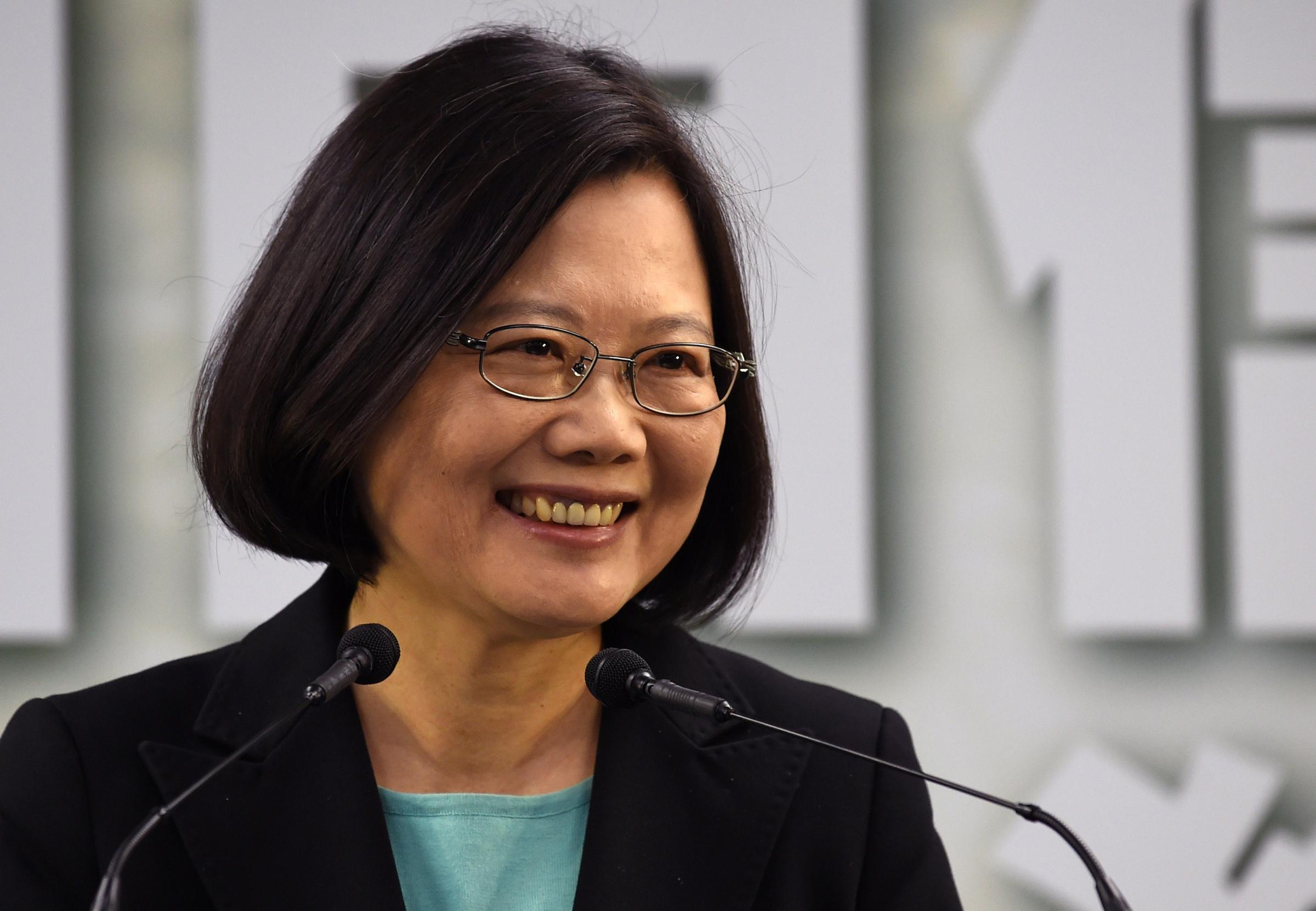
Tsai Ing-wen is making breakfast. The presidential candidate cracks five eggs and lets them bubble with bacon in the pan. She stacks slices of thick, white toast. It’s a recipe adapted from British chef Jamie Oliver, but the ingredients, she can’t help but say, are pure Taiwan. The meat comes courtesy of Happy Pig, a farm near her spare but tasteful Taipei apartment, the bread from a neighborhood bakery. She offers me an orange. “Organic,” she says, in English. “And local, of course.”
This is not an average breakfast for the 58-year-old lawyer turned politician running to become Taiwan’s next President—most days she grabs a coffee and books it to the car. But it is, in many ways, oh so Tsai. The Taipei-raised, U.S.- and U.K.-educated former negotiator wrote her doctoral thesis on international trade law. As a minister, party chair and presidential candidate (she narrowly lost to two-term incumbent Ma Ying-jeou in the 2012 race), Tsai gained a reputation for being wonky—the type who likes to debate protectionism over early-morning sips of black coffee or oolong tea.
Now, as the early front runner in Taiwan’s January 2016 presidential election, her vision for the island is proudly, defiantly, Taiwan-centric. Tsai says she would maintain the political status quo across the strait with China—essentially, both Taipei and Beijing agreeing to disagree as to which represents the one, true China, leaving the question of the island’s fate to the future. But Tsai wants to put Taiwan’s economy, development and culture first. While Ma and his government have pushed for new trade and tourism pacts with Beijing—China accounts for some 40% of Taiwan’s exports—Tsai aims to lessen the island’s dependence on the mainland by building global ties and championing local brands. “Taiwan needs a new model,” she tells TIME.
Whether voters share her vision is a question that matters beyond Taipei. Taiwan is tiny, with a population of only 23 million, but its economy—powered by electronics, agriculture and tourism—ranks about mid-20s in the world by GDP size, with a GDP per capita about thrice that of China’s. Ceded by China’s Qing dynasty to Japan after the 1894–95 First Sino-Japanese War, colonized by Tokyo for half a century, then seized by Nationalist forces fleeing the Communists at the end of the Chinese civil war, Taiwan has long been a pawn in a regional great game. It is a linchpin for the U.S. in East Asia alongside Japan, South Korea and the Philippines, and, most important, it’s the only real democracy in the Chinese-speaking world. “This election matters because it’s a window into democracy rooted in Chinese tradition,” says Lung Ying-tai, an author and social commentator who recently stepped down as Culture Minister. “Because of Taiwan, the world is able to envision a different China.”
Taiwan’s politics irritate and befuddle Beijing. To the ruling Chinese Communist Party (CCP), Taiwan is the province that got away, a living, breathing, voting reminder of what could happen to China if the CCP loosens its grip on its periphery, from Tibet to Xinjiang to Hong Kong. Beijing is particularly wary of a change in government from Ma’s relatively China-friendly Kuomintang (KMT) to Tsai’s firmly China-skeptic Democratic Progressive Party (DPP). When Tsai ran for President in 2012, Beijing blasted her, without actually naming her, as a “troublemaker” and “splittist”—CCP-speak reserved for Dalai Lama–level foes. “A DPP government means uncertainty for cross-strait ties,” says Lin Gang, a Taiwan specialist at Shanghai Jiao Tong University’s School of International and Public Affairs.
To the U.S., which is bound by the Taiwan Relations Act to come to the island’s aid if it’s attacked, Taiwan is a longtime friend and unofficial ally, though the strength of that friendship is being tested by China’s rise. Washington worries that Taiwan’s people, especially its youth, are growing warier of China, and that any conflict between the two might draw in the U.S. “What this election has done is crystallize the changes, the shift in public opinion,” says Shelley Rigger, a Taiwan scholar at Davidson College in North Carolina and the author of Why Taiwan Matters. “I don’t think cross-strait relations are going to be easy going forward, and that’s not something U.S. policymakers want to hear.”
The KMT has yet to formally nominate a candidate for the top job, but the favorite is Hung Hsiu-chu, the legislature’s female deputy speaker. Nicknamed “little hot pepper” because of her diminutive stature and feisty manner, Hung, 67, would be a contrast to the more professorial Tsai should she get the KMT’s nod. “I don’t think [Tsai] is a strong opponent,” Hung tells TIME. Yet the DPP’s choice, who has already started pressing the flesh islandwide, is spirited too. “People have this vision of me as a conservative person, but I’m actually quite adventurous,” she says. And possessed of a sharp sense of humor—when I compliment her cooking, Tsai looks at me with mock exasperation: “I have a Ph.D., you know.”

Tsai grew up in a home on Taipei’s Zhongshan Road North, a street named after Taiwan’s symbolic father, Sun Yat-sen, the Chinese revolutionary who helped overthrow the Qing and co-founded the KMT. Her own father, an auto mechanic turned property developer, was of the Confucian kind: he encouraged her to study hard but also expected her, as the youngest daughter, to devote herself to his care. “I was not considered a kid that would be successful in my career,” says Tsai.
After attending university in Taiwan, she studied law at Cornell in New York because, she says, it seemed the place for a young woman who “wanted to have a revolutionary life.” From there she went to the London School of Economics, where she earned her Ph.D., also in law, in less than three years. “That pleased my father,” she says. When he called her home, she obliged, returning to Taiwan to teach and, in 1994, to enter government in a series of high-profile but mostly policy-oriented roles in the Fair Trade Commission, National Security Council and Mainland Affairs Council.
Even close supporters say Tsai was, and perhaps still is, an unlikely politician, especially for the DPP. Taiwan’s opposition party was forged in struggle and led by veterans of the democracy movement—a fight Tsai mostly missed. The Kaohsiung Incident in 1979—a human-rights rally that was violently broken up by security forces, galvanizing the democracy movement—took place while Tsai was overseas, cocooned in the ivory tower. If the archetypal DPP operative is a bare-knuckle street fighter, Tsai is an Olympic fencer—restrained and precise.
She stepped into the spotlight in 2008, becoming party chair when the DPP found itself booted from office, with its chief Chen Shui-bian, the outgoing President, later convicted of corruption. While she possessed a deep knowledge of policy, Tsai did not then seem like a leader. “She used to sort of hide behind me when we went door to door,” recalls legislator Hsiao Bi-khim, a longtime colleague and friend. “People compared her to a lost bunny in the forest, with wolves surrounding, both from within the party and outside.”
After an unsuccessful 2010 mayoral bid, Tsai ran for, and also lost, the presidency in 2012. Jason Liu, a veteran DPP speechwriter, says now that the campaign did not “sell” Tsai well enough. The ideas were strong, but the delivery left “distance between her and the voters.” Ironically, it was not until her concession speech that Tsai seemed to connect emotionally with Taiwan’s citizens. “You may cry,” she told the tearful crowd. “But don’t lose heart.”
A lot has changed since 2012. Eleven hours after making eggs, with a policy meeting, a cross-country train ride and a harbor tour behind her, Tsai is addressing a couple hundred students at a university in the southern city of Kaohsiung, a DPP stronghold. She’s in lecture mode, at ease, talking about her party’s economic plans: stronger regional links and a focus on innovation to support small businesses. “How many of you went to Taipei for the Sunflower protests?” she asks in Mandarin. At least a third raise their hands.
Taiwan’s students were once seen as apathetic. But during spring last year, Taipei was swept up by thousands-strong demonstrations over a services pact with China. Student and civic groups worried that the deal could hurt Taiwan’s economy and leave it vulnerable to pressure from Beijing. They felt it was pushed through without adequate public scrutiny. The Sunflower Movement, as it came to be called after a florist donated bundles of the blooms, grew into a grassroots revolt, culminating in the March 18 storming of the legislature.
The movement was grounded in questions of social justice. Since coming to power in 2008, Ma has argued that cross-strait commerce is the key to the island’s fortunes, signing 21 trade deals. Yet young people in particular wonder if the deals benefit only Big Business on both sides of the strait. They say rapprochement with Beijing has left them none the richer, and agonize over the high cost of housing, flat wages and the possibility of local jobs going to China. A sign during a protest outside the Presidential Palace on March 30 last year captured the mood: “We don’t have another Taiwan to sell.”
The emphasis on quality of life, and not just macro-indicators, is good news for Tsai. Her vision for a more economically independent Taiwan did not sway the electorate in 2012 but may now have stronger appeal. The KMT, bruised by the Sunflower protests and then battered by fed-up voters in midterm polls last fall, is trying to remake itself as a more populist party. Timothy Yang, a former Foreign Minister who is now vice president of the National Policy Foundation, the KMT’s think tank, says the party stands by its cross-strait record. But even Yang, a KMT stalwart, is keen to address the issue of equity: “The benefits of this interaction with mainland China should be shared with the general public.”
Tsai should easily carry traditional DPP support: much of the south, the youth vote, and those who identify as Taiwanese and who are not a part of the elite that came from China after the CCP victory in 1949. The DPP’s missing link is Big Business, which supports the KMT and closer ties with the mainland, where many Taiwan companies are invested. Tsai recognizes that this is a constituency she needs to woo but doesn’t seem clear as to how, beyond saying, “Our challenge is to produce something that is sensible to both sides without being considered as a traitor to the friends we used to be with when we were an opposition party.”
That will be hard. The KMT has long argued that it, not the DPP, is best qualified to run the economy, which, corruption apart, did not do well under Chen. Tsai’s supporters concede that many citizens feel the same way—that the DPP can be an effective opposition but not administration. “The KMT has always portrayed itself as more suited to guide the economy,” says J. Michael Cole, a Taipei-based senior fellow with the University of Nottingham’s China Policy Institute and a senior officer at Tsai’s Thinking Taiwan Foundation. “There’s this stubborn perception that a DPP government would be bad for business.”
It’s a narrative that the CCP backs and may well float as the campaign progresses, either directly, in China’s state-controlled press, or indirectly, through, for instance, its connections in Taiwan’s business community. “Beijing is going to want to make a point through all sorts of channels, including Big Business, that cross-strait relations will not be as smooth if you vote a government into power that has not accepted the foundation that has underpinned developments of the last eight years,” says Alan Romberg, a distinguished fellow at the Stimson Center, a Washington, D.C., think tank.
Beijing has never been receptive to a DPP government, but it is particularly negative now. Since coming to power in 2012, China’s leader Xi Jinping has proved himself to be more assertive and nationalistic than most expected, a man not eager to compromise. Last September he told a delegation from the island that China and Taiwan might be one day be reunited under Hong Kong’s “one country, two systems” formula, which is rejected by both the KMT and DPP and, surveys consistently show, the vast majority of Taiwan’s people. This May, Xi warned again about the danger of “separatist forces”—a comment widely interpreted as a swipe at the DPP.

Cross-strait relations are managed according to the so-called 1992 Consensus reached by Beijing and Taipei (then also governed by the KMT), a formula the KMT’s Yang calls “a masterpiece of ambiguity.” Under the 1992 Consensus, both sides acknowledge that there is only one China, but without specifying what exactly that means. This, Yang says, has allowed the KMT to move forward on bilateral trade, transport and tourism without being forced to address whether “one China” is the China imagined by Beijing or by Taipei.
The DPP has long promoted de jure independence. The first clause in its charter calls for “the establishment of an independent sovereignty known as the Republic of Taiwan,” not the Republic of China, Taiwan’s official name. This platform resonates with the DPP base but is increasingly untenable given China’s economic clout and growing power on the world stage. While the first DPP presidency under Chen was hardly a break from the past, it did see a cooling with Beijing. Things warmed again under Ma. Lin, the Taiwan expert at Shanghai Jiao Tong University, says Tsai is somewhere between Chen and Ma: “If she wins the election, she will not pursue Taiwan independence. But she will not promote the development of the cross-strait relationship as Ma Ying-jeou did.”
Tsai stresses that she will not alter the politics between Taiwan and China, but she is vague about whether she will repeal the DPP’s independence clause. And unification? That, she says, “is something you have to resolve democratically—it is a decision to be made by the people here.”
Hung, Tsai’s potential KMT opponent, says the DPP flag bearer needs to clarify her stance on cross-strait relations. “People ask her, ‘What is the status quo?’ and she can’t say anything specific,” says Hung. The KMT’s Yang offers a metaphor: “Before you harvest, you have to plow the land, transplant the seedlings, fertilize; all the work … has been done by the KMT, and yet they are going to harvest the crop?”
Tsai believes she will win that right. Several days before I return to my Beijing base, over Taiwan-Japanese fusion in Kaohsiung, Tsai is quietly confident that she will gain the trust of Taiwan’s voters and secure victory, whatever Beijing might think. She puts a final piece of tuna on my plate. It’s from Pingtung County in the south, where she was born. “Go back to Beijing,” says Tsai, “and tell them you were served by the next President of Taiwan.”
—With reporting by Zoher Abdoolcarim, Gladys Tsai and Natalie Tso/Taipei
More Must-Reads from TIME
- Donald Trump Is TIME's 2024 Person of the Year
- Why We Chose Trump as Person of the Year
- Is Intermittent Fasting Good or Bad for You?
- The 100 Must-Read Books of 2024
- The 20 Best Christmas TV Episodes
- Column: If Optimism Feels Ridiculous Now, Try Hope
- The Future of Climate Action Is Trade Policy
- Merle Bombardieri Is Helping People Make the Baby Decision
Write to Emily Rauhala / Taipei at emily_rauhala@timeasia.com